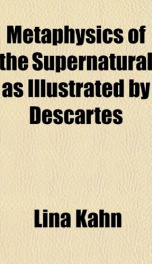metaphysics of the supernatural as illustrated by descartes

Purchase of this book includes free trial access to www.million-books.com where you can read more than a million books for free. This is an OCR edition with typos. Excerpt from book: CHAPTER V DESCARTES IN THE HISTORY OF PHILOSOPHY In the history of philosophy Descartes's fame rests on his treatment of traditional problems and principles. The following appreciation is characteristic of the historical reconstruction of Descartes: "La grandeur de Descartes, sa vraie grandeur, est dans ces pages immortelles où il met en lumière la preuve de l'existence de Dieu tirée de l'idée que nous en avons." ' Similarly the traditional idealistic principles, the Cogito ergo sum, the principle of distinctness and clearness of our ideas as the criterion of truth, and the principle of God on which to ground this criterion, are considered as the most original ideas of his philosophy. He himself, however, as Falckenberg sees it, attributed to them no more importance than is attributed to a vestibule as compared to the whole building. However, "the vestibule has brought the builder more fame, and has proved more enduring, than the temple: of the latter only the ruins remain; the former has remained undestroyed through the centuries." 2 Descartes's real contributions were overlooked: the originality of his scientific philosophy, his appeal to reason, his recognition of the true justification for individualismthe equal capacity for reasoning in all menthe true significance of his doubt, met with no due consideration and appreciation. The burden of responsibility for such a misrepresentation of Descartes lies partly on Descartes himself, partly on his theological contemporaries and the idealistic historians of later periods. As was pointed out, Descartes was compelled to keep his progressive ideas behind the screen of orthodoxy. His contemporary friends, to give his philosophy the appearance of legality and to secure for it a favorable reception, emphasized the traditional pr...
Info about the book
Author:
Series:
Unknown
ISBN:
0806530863
Rating:
4.5/5 (4)Your rating:
0/5
Languge:
English
Users who have this book
Users who want this book
What readers are saying
What do you think? Write your own comment on this book!
write a commentif you like metaphysics of the supernatural as illustrated by descartes try:
Other books by this author
Do you want to read a book that interests you? It’s EASY!
Create an account and send a request for reading to other users on the Webpage of the book!


